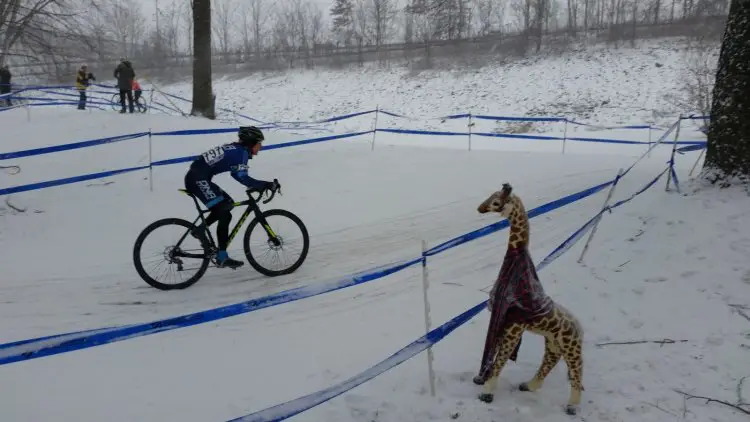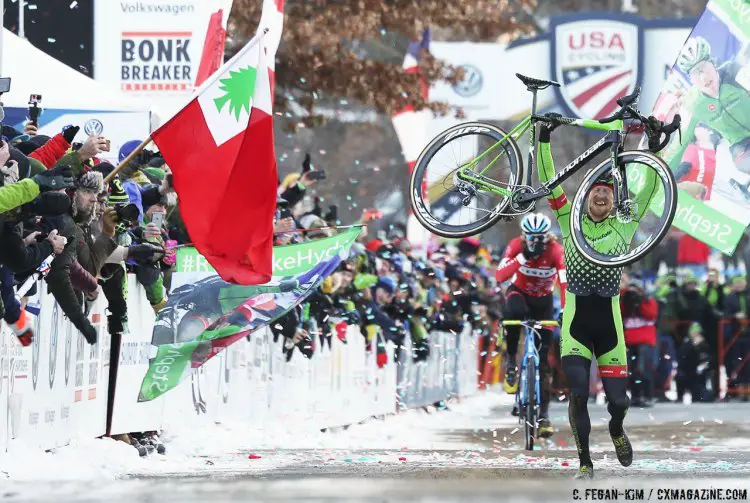Every other week during the cyclocross offseason, Coach Chris Mayhew brings us a new edition of Training Tuesday. Many of readers are going strong on the road or mountain bike during this part of #crossiscoming season, and so revisiting your pre-race routine is never a bad idea. In today’s installment of Training Tuesday, Coach Mayhew talks about the importance of having a pre-race routine, but working some flexibility in to deal with the unknown unknowns of race day.
Coach Mayhew is still interested in hearing what training topics you want to know more about. Send questions to [email protected] or tweet Coach Mayhew at @csmayhew.
I’ve written before about the importance of pre-race routines, both as warm-up and practices. I think it’s one of the more important things that should be taught at cyclocross clinics. But listening to a lot of Mike Creed has planted another thought in my head: do not be so dependent on your routine that you cannot function without it. That is at least as bad as having no routine and may be worse.
Today, we take a look at what is good and bad about having a set pre-race routine.
Pre-race routines come in all shapes and sizes and definitely have their benefits on race day.
What’s good about one? Prior planning prevents poor performance. The 6 P’s, as they are called. You can eliminate a lot of variables on race day if you have an idea in mind of how you’re going to perform. You can plan ahead and execute things on autopilot while stressed. You can take all the things that have worked in the past and roll them into one big best practices execution on important days. It gives you a sense of control on race day when so many things are ultimately not under your control. It also helps get you into the mindset of competition. If you have ever looked at a safety pin and gotten a little hyped, you know what I mean.
Often I think race routines become crutches or cop-outs though. They can make an athlete fragile rather than resilient and that is not what the athlete or coach wants to happen.
Let’s take an example from another field. During Operation Neptune Spear one of the helicopters crashed upon arrival. That is a big deviation in the plan, right? Did everyone pack it in and say they’ll try again tomorrow? Did everyone say, “Well, one thing went wrong, now nothing will go right.”
That’s often what happens with athletes. They often feel that if they cannot execute their plan to perfection then things have gone wrong and they failed. These situations reflect a lack of resilience. Projecting negativity from one unforeseen issue on all future things is catastrophizing, another symptom of a lack of resilience.

You never know what kind of challenges are going to stick their neck out on race day. Melinda McCutcheon at 2017 Cyclocross National Championships, Singlespeed Women. © Cyclocross Magazine
So what’s the balance? Have a plan, definitely, but don’t be wedded to it. Things can go wrong on race day. Maybe you forgot to pack something. Back in the dark ages people used to get lost going to races. All sorts of things can go wrong, but they do not negate all the training and effort you’ve put in up to now. They do not negate all the fitness and skill you have. You are still you, you just have something suboptimal to deal with now.
All sorts of things can go wrong, but they don’t negate all the training and effort you’ve put in up to now. They do not negate all the fitness and skill you have.
At the same time that is where the magic happens. Are you inspired by athletes who are totally dominant and nothing ever goes wrong and they always win with seeming ease? Of do you find some inspiration in people who had to overcome some obstacle to get where they are? You could easily be that person for someone else. Or at least be that person for yourself.

Our best stories are written when we are prepared to overcome adversity. Stephen Hyde (Cannondale Cyclocrossworld) at 2017 Cyclocross National Championship, Elite Men. © C. Fegan-Kim / Cyclocross Magazine
What to do when your plan does go wrong? When things go wrong acknowledge it immediately. No sense in pretending like it is not happening. Then figure out a plan to deal with it. Got lost? Start changing at lights. (Been there). Forgot something? Borrow it. Figure out a way around it. Improvise, adapt, overcome, as the Marines say. There’s usually a way around it. I have loaned or borrowed every single item involved in bike racing.
A big issue at the 2017 Cyclocross Nationals in Hartford was the frequent course changes on the first few days of the event. That is an issue you have no control over and pretty well ruins your pre-riding. When you don’t have control over something, do not dwell on it. There is nothing you can do about it. Everyone else is going to have to deal with it as well. It does not change anything about you as an athlete. Carry on as you normally would and don’t waste your time or energy on it.

The course in Hartford featured multiple course changes and conditions that changed daily. Riders had to be ready for all kinds of challenges. © D. Perker / Cyclocross Magazine
Have a plan. Have a good plan. But don’t let it decide your fate. “No fate but what we make”. And do not let it negate all the work you’ve put in up before race day. Forgetting your shoes does not take away the fitness you gained from interval training, it just means you need to find a new best friend in the parking lot.
Have a plan. Have a good plan. But don’t let it decide your fate.
Your pre-race routine should be a goal, a best-case scenario. Your ability to deal with suboptimal things, like missing the entrance to the pit, (Thank you to @mrkatiecompton Mark Legg for the link) is where growth happens as an athlete. It is where you learn from overcoming adversity and coming out the other side with stories of success. Practicing resilience in the little things means you will be better-prepared to deal with the big things that pop up.
Have a plan, but don’t be dependent on a plan. Be ready to deal with the curveballs race day can throw at you.
Can’t get enough? Browse all of our Training and Technique Tuesday pieces here from coaches Mayhew and others. Mayhew expects to contribute Training Tuesday installments every two weeks in the off-season.




























